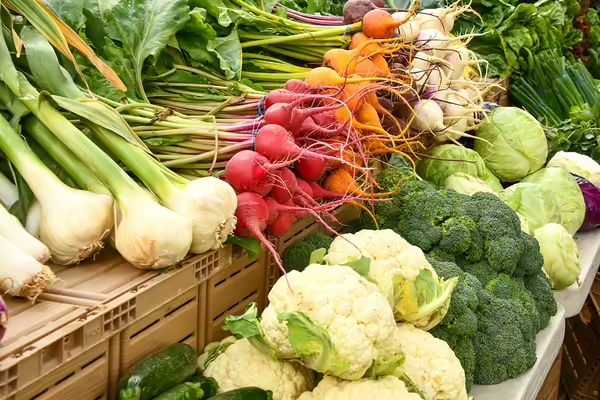
URBANA, Ill. — Illinois food growers, distributors and activists voiced solutions for creating a more resilient and equitable food system in Illinois: support for growers and producers of all experience levels, investment in education and marketing strategies, and advocacy engagement to secure more funding.
More than 300 people involved in Illinois’ food network met in 30 listening sessions hosted this spring by University of Illinois Extension as part of the $28 million Local Food Purchasing Assistance program. LFPA, a new federally funded program in 2023, is an opportunity to invest in food production and procurement in Illinois.
Around 95% of the food consumed in Illinois is purchased outside the state, according to the latest data available from the Illinois Local and Organic Food Farm Task Force.
“The need for infrastructure investments in Illinois was mentioned in nearly every listening session as a necessary step to improve the state’s food system,” says Jennifer McCaffrey, assistant dean for Extension’s family and consumer sciences programs, including Extension’s work in Supplemental Nutrition Education Programs, also known as SNAP-Ed. Attendees highlighted the importance of building up transportation and distribution infrastructure to transport food from the farm to the market and from the market to the consumer.
Infrastructure Challenges
“It’s really hard work getting the food safely to that end user in a timely manner,” an attendee said. “From harvest, it takes people; it takes buildings; it takes refrigeration; it takes electricity; and it takes gas.”
Moving food to the consumer could be made easier and safer by expanding cold storage at nearly every point of the distribution process. Additionally, more food processing facilities are needed that can accommodate small to mid-size growers.
The lack of processing facilities contributes to food waste, long wait times, and longer travel distances. At the time of the conversations, meat producers stated their wait times for meat processing facilities in Illinois can sometimes be over one year which has forced producers to drive increased distances to get their products processed timely.
Fruit and vegetable growers also expressed a need for processing facilities or commercial kitchens that could help extend the shelf life and reduce waste, especially during peak growing season, and provide year-round product availability.
Additional infrastructure needs include expansion of the Electronic Benefits Transfer and additional staff for harvesting, handling, transportation, and selling.
Agribusiness Development
Farmers say they are challenged by balancing the skillsets required to be both business owner and farmer. They stated a need for marketing expertise, investment capital, de-risking strategies, financial planning support, and land access.
They raised questions about where to find land to farm, purchase, or lease and how to financially make it work. The average farmer in Illinois is 58 years old, and succession planning should be essential to any agribusiness discussions. The Illinois Farmland Access Initiative was established in collaboration with The Land Connection, The Conservation Fund, and The Liberty Prairie Foundation to establish a much-needed farm access strategy for Illinois. Listening session attendees felt these concerns needed additional attention.
Consumer Needs
“A sustainable food system requires a new orientation to food, understanding the relationship between food and the land, and understanding the connections between human health,” said an attendee from the Galesburg area. Connecting the consumer to where the food comes from and who grew it could help address this knowledge gap.
Farmers express concern that consumers don’t know how to prepare and eat the foods they grow. A better understanding of food preparation techniques could improve nutritional intake and reduce food waste.
Part of the LFPA’s funding provides cultural foods to consumers in underserved communities.
“This is a new opportunity for Illinois farmers to grow and produce more culturally relevant foods to meet these demands," McCaffrey says.
Innovative options are also needed to increase food access. Delivering directly to consumers eliminates the time, transportation, and mobility barriers to access food. A network of shared delivery vans could reduce the financial burdens to organizations exploring delivery options, participants offered, or mobile units could increase accessibility and meet consumers where they live.
Is a sustainable food system in Illinois achievable?
Greater connectivity throughout the food network is needed, respondents indicated, but so is accountability.
“One thing we want to see if we are going to participate is that this actually addresses systemic challenges and systemic problems so that we’re truly using this to change the system as opposed to just continue shoving food through a pipeline that is broken,” one listening session participant said.
LFPA is funded for two years, and advocates expressed the importance of securing more funding by engaging with legislators on a state and federal level.
“While programs such as Local Food Purchasing Assistance are a step in the right direction, short-term funding is insufficient to support local farmers effectively, consistently provide fresh produce to underserved communities, or build a sustainable local food system,” McCaffrey says. “To build a long-term sustainable food system for Illinois, the state must support growers and producers of all experience levels, invest in education and marketing strategies, and engage in advocacy efforts to secure more funding. Together we can build a better food system for Illinois.”
Applications Open
Applications to participate in the Illinois – Equitable Access Towards Sustainable Systems (EATS), funded by LFPA, are now open. More information is available at go.illinois.edu/LFPA, including the list of guidelines to qualify as socially disadvantaged growers and producers. Extension staff are available to answer one-on-one questions from 11 a.m. to 1 p.m. each Tuesday through the application deadline of October 31. Email uie-lfpa@illinois.edu to secure the login link.
Illinois Extension leads public outreach for University of Illinois by translating research into action plans that allow Illinois families, businesses, and community leaders to solve problems, make informed decisions, and adapt to changes and opportunities. Illinois Extension is part of the University of Illinois Urbana-Champaign College of Agricultural, Consumer and Environmental Sciences.